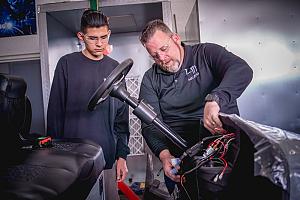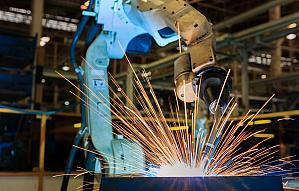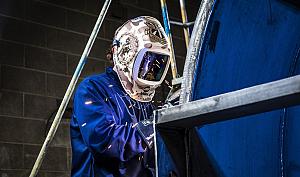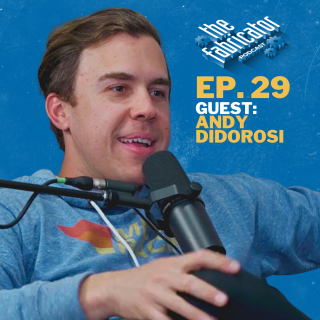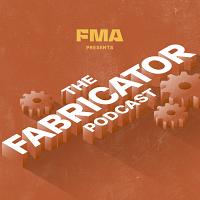Buying a factory, starting a race team, and reviving Detroit with Andy Didorosi
Since starting The Detroit Bus Company in 2011, it's been nonstop movement with a purpose for Andy Didorosi. After getting DBC off the ground, he has launched a number of other Detroit-focused initiatives, including The Detroit Student Race Team, Mutiny Racing, and The Arsenal of Clean. And housing all of those projects is a old 55,000-square-foot multi-purpose factory that he recently bought right in the middle of downtown Detroit. Andy joins The Fabricator Podcast to talk all about of those things, Japanese Kei trucks, and more.
At the top host Dan Davis and guest host Darla Welton talk about, of course, their favorite bus-related stories.
Email us at podcast@thefabricator.com with any comments, questions, or suggestions.
In This Episode
Register for FABTECH 2023.
Learn more about FMA's GOLF4MFG and support Nuts, Bolts & Thingamajigs.
The Detroit Bus Company set out to address Detroit's public transportation problem. The company now has a fleet of buses that offer charters, tours, and free/discounted school transit.
The Detroit Student Race Team has the mission of making motorsport racing accessible to students from Detroit, Highland Park, and Hamtramck.
Mutiny is another product of the factory that Andy bought. The purpose of Mutiny is to take used vehicles and convert them from combustion engines to electric drivetrain.
Arsenal of Clean began during the COVID-19 pandemic in 2020 to provide affordable and safe hand sanitizer for Detroit.
TRANSCRIPT
Andy Didorosi (00:00:00): They say in business, every deal dies eight times. So this purchase, it was a tough thing to do. And then finally we signed all of it and we're like, okay, we need the keys now. And they were like, oh no, you need this insurance policy and this and that, and you got to register with the state. And I had no idea how complex it could be buying yourself your own personal factor.
Sara Spring (00:00:31): The countdown to FABTECH is on. FABTECH is the place to be for the latest and greatest technology industry knowledge, networking, and more. Meet your favorite influencers, see live equipment demos, and make connections to advance your career. This is North America's largest metal forming, fabricating, welding, and finishing event and you don't want to miss it. Register for free today @fabtechexpo.com and I'll see you in Chicago.
Dan Davis (00:01:01): Hello. Welcome to the Fabricator Podcast. I'm Dan Davis with the Fabricator magazine, joined by Darla Welton. You might know her from such exciting things as Still Building America on the fabricator.com blog, Brown Dog Welding, Josh Welton, Cool People in Detroit, that's another one of our clubs and it's official. Today we're going to be speaking with Andy-
Darla Welton (00:01:27): Didorosi.
Dan Davis (00:01:28): Correct. I just can't do that name without mispronouncing a vowel. Andy's with Detroit Bus Company, I think it's his big one. He'll kind of go into that. But also just a guy with a lot of plans and a new owner of an old car factory.
Darla Welton (00:01:44): That's right, yeah.
Dan Davis (00:01:45): So it's pretty exciting stuff. So before we jump into this, we figured since Andy is the owner of the Detroit bus company, we would talk about our favorite bus stories. I know that's not a real estate that's covered on the internet, but I figured I would start eighth grade field trip going to Mobile Alabama. So they let these kids outside State Line in Louisiana. And I had a friend who was trying to get the attention of a young lady on another bus, and he's pounding it on the window so hard it shatters. "Hey, Robin. Hey, Robin." Oh no.
Darla Welton (00:02:29): Oh my gosh.
Dan Davis (00:02:29): So needless to say, he got Robin's intention.
Darla Welton (00:02:33): Wow.
Dan Davis (00:02:34): He got the attention of the bus driver and the principal. Yeah, that was it. I don't know if that was worth the excitement.
Darla Welton (00:02:41): Wow. We recently had it, there was a kid in the metro Detroit area who the bus driver passed out driving a bus full of elementary school kids and he saw what was going on. I think the kid was in fourth grade or something.
Dan Davis (00:03:00): Seventh grade.
Darla Welton (00:03:01): Okay, was it seventh grade?
Dan Davis (00:03:02): Yeah.
Darla Welton (00:03:02): Okay.
Dan Davis (00:03:03): Here it is, a month ago.
Darla Welton (00:03:04): Yes. He had the mindfulness to see what was happening and he ran up front and saved the bus full of kids. And he got all these awards from the city? Yes, right here.
Dan Davis (00:03:16): Oh, wow. Warren, Michigan
Darla Welton (00:03:17): In Warren. Oh yeah, just right off the road.
Gareth Sleger (00:03:18): How far is that from the-
Darla Welton (00:03:19): It's right next to Detroit.
Dan Davis (00:03:20): Okay. It's a short bus ride away.
Darla Welton (00:03:22): It's a short bus ride. This is correct. But yes, this driver just passes out, this is wild.
Dan Davis (00:03:30): Yeah. I think your bus story is better than my bus story.
Darla Welton (00:03:31): And look at this kid, this is incredible. I guess he said he watched the bus driver enough that he knew what to do. That's just so cool.
Dan Davis (00:03:43): Good job kid.
Darla Welton (00:03:44): Right?
Dan Davis (00:03:45): Man.
Darla Welton (00:03:45): That's amazing.
Dan Davis (00:03:46): The more people we meet and the more stories I hear, I'm just a very unspectacular person.
Darla Welton (00:03:52): I was unassuming this. Oh, gosh.
Dan Davis (00:03:56): I don't even know if I fly off of ordinary anymore.
Darla Welton (00:03:59): Un-ordinary. There's another great video of a bus driver in Michigan. I want to say it was on the west side somewhere, maybe it was like Kalamazoo. But it was really, really icy and everybody kept reposting this video because they're like, yep, kids go to school in Michigan even when it's snowing and icy out. This bus driver's just trying so hard to get out of the... Just wheels are spinning for a really long time, and then it's like you're just pulling for them, pulling for them, pulling for them and they finally get up. But the video's really spectacular.
Dan Davis (00:04:33): My favorite bus video is the one where it is not evil Knievel, but I think it's someone who is an entourage. I don't know if it's a relative, that actually jumps the bus over motorcycles. And so the more traditional jumping the motorcycles over the buses.
Darla Welton (00:04:46): Interesting.
Dan Davis (00:04:47): Yeah. I'm sure it's something that Andy can do at some point.
Darla Welton (00:04:52): Don't put it in his brain because he will do it. He will do it I promise
Gareth Sleger (00:04:59): That would be the first question we ask in the second interview with Andy.
Darla Welton (00:04:59): Oh my gosh.
Dan Davis (00:04:59): Yeah, that could have gone for three hours.
Darla Welton (00:05:01): Andy one time accidentally bought all of the airport signs from Tulsa airport on eBay or something.
Dan Davis (00:05:09): Accidentally?
Darla Welton (00:05:10): Yes. And then he ended up with all of them at the bus company, so he had to resell them all online. These are just the things that happened to Andy.
Dan Davis (00:05:20): I'm trying to think, you might be able to buy a town and just rename it Tulsa and just start using that all around.
Darla Welton (00:05:24): There you go. Maybe that's just the way to go with all of those. I don't know.
Dan Davis (00:05:28): So stay tuned for good bus banter. If you have a town in Michigan you'd like to sell and rename Tulsa, please contact podcast@thefabricator.com and enjoy this episode with Andy.
Darla Welton (00:05:43): Didorosi.
Dan Davis (00:05:45): Thankee
Darla Welton (00:05:45): Thankee!
Gareth Sleger (00:05:46): We're keeping it.
Dan Davis Y'all enjoy. I need help. Bye.
Sara Spring (00:05:55): Tee off for the trades and support the next generation of manufacturing. Join us on Monday, August 21st at the Glen Flora Country Club in Waukegan, Illinois for Nuts, Bolts and Thingamajigs Annual Golf for Manufacturing event. All proceeds go towards supporting NBT programs such as summer manufacturing camps, grants, and scholarships. Reserve your spot today by visiting nbtfoundation.org. And now back to the episode.
Dan Davis (00:06:27): And today's guest is Andy Didorosi.
Gareth Sleger (00:06:31): You nailed it.
Dan Davis (00:06:32): Thank you. I practiced at least mentally. Andy is a man of many pursuits and passions. Darla and Josh introduced him to the Fabricator community and a blog entry a couple of years ago. I think probably the biggest most high profile thing you're involved with is the Detroit Bus company. But maybe I'll let Darla since y'all know each other a little bit better, maybe if you want to take the lead on this and let's learn more about Andy.
Darla Welton (00:07:02): Yes. Andy, our friend who is so multifaceted and has so many intriguing things about him. When I think about you, I don't even know where to start but usually it's bus company obviously. But Andy is also our friend who we've gone to a wake for his dog. So actually it wasn't called a wake, what did you call it?
Andy Didorosi (00:07:24): A Mel memorial because her name was Mel.
Darla Welton (00:07:27): Yes, the Mel Memorial.
Andy Didorosi (00:07:28): Mel Pit bull because we were fellow pit bull enthusiasts.
Darla Welton (00:07:30): That's right. Yeah, and I haven't really done that for any of our other friends but that's the kind of guy Andy is. You do the thing you've never done before because it's Andy. But yeah, when we did the Still Building America blog on you, it was in 2020 and we talked about the bus company but you had also launched Arsenal of Clean. He brought a full tanker of alcohol, what kind of alcohol?
Andy Didorosi (00:07:58): Ethyl alcohol.
Darla Welton (00:08:00): Yeah, ethyl alcohol so that he could make hand sanitizer for the community, which incredible. But then we touched on some of your various other projects, but we've also been a little bit involved with Andy and the Detroit Student Racing Team, giving some welding lessons and obviously we would love to do more of that. But let's talk about that a little bit because I'm sure we'll be able to share the blog and that can kind of catch everybody up. We'll talk about bus company too. But let's talk about the Detroit Student Race Team a little bit, why you started it and kind of where it's at now.
Andy Didorosi (00:08:43): Yeah, so the Detroit Student Racing team, we teach kids how to wrench, how to weld, how to fabricate, how to race full-size cars. So they learn how to put cages in and do all kinds of stuff. Obviously they have mentors helping them so it gets done right, but they also learn how to work together, how to experience disappointment because if you know anything about racing it's rot with disappointment. It's through the whole thing, to work all summer and then have it result in something that breaks in the first lap. So yeah, so it's Detroit High School kids, Detroit Highland Park and Hamtramck. If you don't know Detroit, it's got these two little cities inside of it. But obviously there's not a lot of economic means here.
(00:09:21): We have a lot of poverty in town, and so it means you have limited access to opportunities. You just don't have a lot of programs you can go to like other kids in other cities might. They might have an auto shop program or something that they could attend. There's not much of that in Detroit. So I own this bus company. It does well. We have this giant garage, and I had the idea in 2019 to start this student racing team as a nonprofit. Free to attend, free for every... We'll just pay for it as the bus company. I didn't raise any money. I thought we can just start Wednesday shop nights and then see where it goes from there. And I asked a teacher friend of mine, I said, "Do you know any kids that would be perfect for this?" And she said, "Yes, I have one. His name is Noah."
(00:10:01): And so she asked Noah and gave him my Instagram, and Noah proceeded to harass me every 30 days I guess. I think he had a reminder on his phone set up-
Darla Welton (00:10:10): Probably, that sounds like Noah.
Andy Didorosi (00:10:11): Every 30 days to ask me when is the team starting? And clockwork, his message would be there again on the first. And finally in 2020 just before everything broke loose I said, "Sure, let's do it, Noah." So I put out a little announcement. We distributed some flyers from schools and we had about 20 kids show up for this first sort of orientation day. Not a lot of planning but here it was. And then the pandemic hit. And so I think we had our first shop day like February 2020. And then shortly after there was no shop night, there wasn't any. So this program that barely existed went remote. And we kept everyone together on an Instagram group, but it took a few months for us to get through the early COVID stuff and then be able to have shop night at the shop with masks and distancing and trying to do the thing, trying to maintain this thing that was just barely starting.
(00:11:14): And so, flash forward to now and we have sent half a dozen kids to school. They've gotten great scholarships in part because of their participation. We've gone and raced in Pennsylvania and Ohio. And we've taught a lot of kids how to make TIG probably better than I can. It's certainly better than I can because they don't have bad habits. And it's just fascinating what you can do if you're a lightning rod for this kind of stuff.
Dan Davis (00:11:40): Does that kind of reflect back on your early days tinkering with stuff?
Andy Didorosi (00:11:45): Oh my gosh, no. So I didn't have anybody to mentor me in this stuff. So I still have fond memories of our first cage and how we were just using a TIG process and just feeding random bits of scrap metal into this monkey's paw of weld. And I don't know how it passed tech. It actually, when the first car got to the... Not the student team but our own, we brought it to tech and they were like, "What are you doing?" And our answer was to hack open holes on the roof so we could finish the weld around the top. And this was a more is better kind of situation. They just wanted to see a complete weld not a great weld. So I'm an excellent grinder. I'm a fantastic grinder.
Darla Welton (00:12:26): As one has to be.
Andy Didorosi (00:12:27): As one has to be if you're not a good welder. But then Josh coming through and helping us teach kids how to weld and stuff, I've picked up a ton. A lot of patience and just understanding what's going on inside of that funny buzzy machine.
Darla Welton (00:12:42): I know. Do you still have one of our machines, or do we need to get it back to you?
Andy Didorosi (00:12:45): I think I have it.
Darla Welton (00:12:46): Okay.
Andy Didorosi (00:12:46): You can send another one too.
Darla Welton (00:12:49): Okay. Yeah, we could do that. We like to keep you guys hooked up. Yeah, we'll have you guys in the shop again soon to play around with the-
Andy Didorosi (00:12:59): Yeah, we brought cutters over to your dome arch structure, your Quoset.
Darla Welton (00:13:05): Our Quoset Hut, our World War II era Quoset Hut.
Andy Didorosi (00:13:09): Love the Quoset. No, the kids love that. We've taken field trips to your shop. We've taken field trips to KATA Motorsport where they do the top field dragster stuff. We've taken the kids to car museums and the Grand Prix, and it is really just awesome. And I guess what I'm trying to get across here is if you want to do this kind of work, and I've had a lot of people approach me and say, "I also want to have my own student racing team or whatever." There's tons of resources to connect to and there's tons of kids who want to do what you're doing regardless of what community you're in, because the race car thing is just a great magnet to get kids to come and learn about all kinds of stuff.
Darla Welton (00:13:46): Absolutely. Kids that are curious.
Andy Didorosi (00:13:49): There's lots of things on the car too. There's electronics and paint work and vinyl work and marketing stuff. And it's kind of very similar to robotics, first robotics without very much structure.
Dan Davis (00:14:02): Some of the guys Darla had mentioned are actually doing it in college now?
Andy Didorosi (00:14:05): Yeah, exactly. Well, they've gone on to their Formula SAE teams, which now they have the Formula SAE electric stuff that they're doing. One of our students was a marshall at the Grand Prix last weekend.
Darla Welton (00:14:17): Wait, who was that?
Andy Didorosi (00:14:18): Noah was a marshall. He was a corner worker.
Darla Welton (00:14:20): He was?
Andy Didorosi (00:14:20): Yeah.
Darla Welton (00:14:20): Stop it.
Andy Didorosi (00:14:21): He had the full headset, safety gear, flagging and doing all. I was like, how did you possibly... It was awesome.
Darla Welton (00:14:26): Come on, I love that. We kind of missed it because my little brother was getting married, so I didn't get to keep eyes on much of what was going on but that's so awesome.
Andy Didorosi (00:14:34): It was cool.
Darla Welton (00:14:35): He's such a great kid.
Andy Didorosi (00:14:36): Yeah, he's very focused. And we've got kids that went to U of M, Ann Arbor and Dearborn and-
Darla Welton (00:14:42): Bailey.
Andy Didorosi (00:14:43): Yeah, Bailey's doing great. Yeah, she caught a bunch of scholarships and she's grown up now. It's wild. It's just been six months. So that's one of my favorite projects, one of my favorite things. We still have shop night every Wednesday, and it's the safe space for kids to come and get pizza, learn something, kind of unwind a little bit. And then we're finding that skills that we think are really common like being able to hold a wrench just aren't. They don't have that opportunity to trial and error on this kind of stuff. And so giving them those skills and teaching them how to handle tools safely and what to manage not to eat over the pizza box. These are really useful skills when they go into an interview or a workplace or whatever that other kids just don't get. And of course, we know that the skills around technical things and tacit knowledge around handling tools and material is so scarce now.
Darla Welton (00:15:44): Incredibly scarce.
Andy Didorosi (00:15:45): And it's not just in Detroit, but it's universal everywhere. I went to a really well-heeled high school, very well-funded, and they turned our auto shop and wood shop into yet another swimming pool. So now they have two swimming pools, which is wonderful because they get judged based on how many top-notch swimmers they pump out, not how many woodworkers and metal workers they pump out. I was the only kid that took the automotive vocational class. I had a two-hour shop basically to all to myself. No kidding. And the teacher was the football coach because he had to technically be a teacher. So they put him in the least important teaching role from their perspective that they could, which was auto shop. Yeah, he barely knew how to change a tire.
Darla Welton (00:16:26): Unfortunately that seems to be the norm. So seeing people like you offering that kind of program in the community is so important. That's why we love opening up our shop doors too. Now you've got something going on, come on over. We want to be a part of that too and contribute however we can.
Andy Didorosi (00:16:46): Yeah, I think a lot of people when they start things like this they think too big. They think they need to do 50 students or 100 students, or have it be some mega huge program or have some official partnerships with schools or whatever. And I'll tell you, wherever you are there's neighborhood kids and they want to learn this stuff. And they're riding by on broken bicycles and stuff. There's just always somebody somewhere who wants to learn that. I have fond memories at my great grandma's house across the street there was Mr. Hemming. And Mr. Hemming always had his garage open, he's always wrenching on something. And I was very little, I didn't know much of what was going on but I got to watch and see this and be a part of it.
(00:17:25): We used to teach these kinds of things in community, we used to share. And a lot of agricultural communities I think do this really well and urban and suburban ones do not. But let me tell you, if you're in the market for a diesel mechanic or HVAC metal worker, you're going to be paying top dollar right now. The market for Olympic swimmers is not that good. So there's obviously an imbalance of what's needed and what's getting taught and where the incentives are.
Dan Davis (00:17:53): Yeah, you see a lot of communities around the US and we cover them as part of the magazine where there's a groundswell. People kind of want to reinvest in those tech areas of the high school that were ignored, not necessarily plowed over for a pool but probably just weren't developed. And once the commitment's made, then comes the effort to get people in there. Just because you build it, they won't come automatically. So it's interesting to hear that there's still opportunity for improvement in other areas.
Andy Didorosi (00:18:20): Yeah. Well, the whole school curriculum I think needs to be brought into question. We're kind of setting people up for these 40 or 50 year careers that don't exist anymore. We're giving them skill sets that aren't flexible, that aren't resilient. And now we have project-based work, really if you have a career somewhere that's three years, that's fantastic nowadays as a younger person. Most engagements are four to six months or so. And so I think just the whole process by which we educate and prepare people, especially very young people for the workplace, needs to be evaluated and looked at. And so I think a lot of people's education starts at 3:00 PM. Mine started at 3:00 PM, it started when I got home. And I got to mess with stuff that I garbage picked, and that's how I learned how things worked and pulled them apart and didn't get in trouble.
Dan Davis (00:19:08): You mentioned agricultural communities, that's what's happening on the farm. They're trying to make things work just by trying to figure it out.
Andy Didorosi (00:19:15): That's exactly right. And kids get into circle track racing very young. There you have the four cylinder racing and you learn a lot of skills in doing stuff like that. There's a reason why there's circle tracks all across the Midwest, is because they're entertaining. It's a good magnet. It's exciting. We forget sometimes that education needs to be engaging and fun. You can't just pop someone down in front of a computer who's not suited for it and expect them to be successful.
Darla Welton (00:19:39): Yeah, and I think it's really cool not only are kids on the racing team getting their hands dirty, trying new things, but they also see their mentors having fun. If you go into the shop space where they're having these team gatherings, it's fun. The relationships between the students and the mentors seem so genuine. And when you build those kinds of relationships, you don't want to disappoint those people. And I've even watched you with one of the students, maybe he wasn't quite doing what he was supposed to do and just saw you very kindly take him aside and talk to him and try to encourage him. And so it was like you're having fun, but also teaching respect and these are the things we have to do. It was nice to see that because I know discipline and the public school system it's like chaos. So it's difficult. You have so many teachers, you have so many students and there's all these problems that students are bringing from home into the classroom. And there's so much going on, and they don't always get that one-on-one like that.
(00:20:54): And teachers also maybe don't have some of the capacity that you would in mentoring. So I think that's really special. How many mentors do you have on board?
Andy Didorosi (00:21:06): Right now I think we have four that are almost at every shop night. And then we have sort of a revolving crew of four or five more. So we vet people to make sure that they... Of course, all the safety stuff, they have a great background. But then also they're bringing some kind of skill to the table. So a bunch of our people are automotive engineers at one of the big three. They either work in a technician capacity or in the industry. We're just so lucky to have all the automotive stuff in our backyard. It couldn't be a better city in the world if you need to get a gear cut, or some assembly made or a bearing at 3:00 in the morning and you know Detroit's the spot, right?
Darla Welton (00:21:49): It is.
Andy Didorosi (00:21:50): And I think we take that for granted a lot of the times. When you go somewhere else, you go to LA or a Seattle, you just don't have that stuff. And so I grew up amongst it, so I'm like, yeah, there's bearing service right down the street. I can bring them this and they'll give me another one. And so I think extending that to the mentorship too and who we can attract and who's interested in what we do. And almost anyone I ask to say, "Hey, I want you to come by and spend an evening on a Wednesday to help teach these kids your thing." I don't think I've ever gotten a No.
Darla Welton (00:22:22): I can't even imagine.
Andy Didorosi (00:22:23): Yeah, I don't think I've ever gotten a no. I've gotten, I'm busy that day but maybe later. But no, it's really a great tool to connect this. One of my favorite stories him, we were at one of the races that we were at and I noticed Ralph Gills from SRT a few pits down. And Noah, our student is an aspiring automotive designer and Ralph is the top guy in the game. And so I grabbed Noah by the hand and I was like, "Noah, come on. You're going to meet Ralph." And I dragged Noah over and I was like, "Ralph, Noah, Noah, Ralph, Noah, show him your drawings." And Ralph's like bushwhacked but he couldn't say no. He's not going to be go away. And so Noah busted this stuff out and they had a meaningful conversation about design. You need that kind of forcing function to say, here, you're going to help now. And most people will step up to the plate.
Darla Welton (00:23:13): Absolutely. Yeah, when it comes to kids and you're an expert in something, and I feel like the older you get if you're really passionate about what you do you eventually want to empty that cup, right?
Andy Didorosi (00:23:23): Yeah.
Darla Welton (00:23:24): Yeah, absolutely. You do such a good job.
Dan Davis (00:23:26): We were all kids one time too, I can't speak for everybody.
Darla Welton (00:23:26): I think I still am.
Dan Davis (00:23:26): Unless you have Benjamin Button disease or something. I don't know.
Darla Welton (00:23:33): I feel like I still am a little bit. I haven't let go of that. I feel like you're that way too. I still get that-
Andy Didorosi (00:23:37): I have two firetrucks, so yeah.
Darla Welton (00:23:40): Yeah, exactly.
Dan Davis (00:23:43): Shop night. Where does that take place?
Andy Didorosi (00:23:45): So it's at our factory. So let me set the stage. So I bought a 55,000 square foot former automotive factory. It made envelopes for 50 years. It made car parts as part of Lear Siegler. And then before that it was Link-Belt. So they created the furnace self stoker, like a little tiny conveyor belt for your house. And then when the automotive industry exploded, they sold a lot of assembly line parts for Henry Ford. And then they bought the steam shovel company to make Link-Belt that we know today that makes cranes and steam shovels and stuff.
Dan Davis (00:24:14): Oh, wow. The logo is still on the building, right?
Andy Didorosi (00:24:16): Big old gear right on top. And so this a building with a ton of deferred maintenance that needs all this love, but it's ours and we don't have to answer to a landlord or anything. It's on a bunch of land. It's right in the middle of the city, and that's where the bus company lives. That's where the Student Racing Team lives. We're starting some new manufacturing stuff there through Mutiny, which I'll tell you about. But it's this sort of Rob Dyrdek's Fantasy Factory of all these different things that I'm uniquely interested in. And I found a lot of other people are too. And like I said, there's two firetrucks. We've got go-karts and race cars and all this stuff that is just a great ephemera to be around when you're trying to come up with what the future looks like.
Gareth Sleger (00:24:58): Right. So how did you get that factory?
Andy Didorosi (00:25:02): Well, I was actually looking for a place for us to move to because our lease was up. Ford bought the train station in Corktown and our lease rate went up astronomically because we were right there in the thick of it. But I get it, it's business. But I was sick of moving every five years. Every five years I'd pack everything up and this excruciating move, tons of big equipment. I have to redo all the heavy power. It is a nightmare. And so finally I was like, I'm going to buy something and I don't care if it's the worst building in the city. I want to own it and never have to move again. We'll just work on it. And I went to see this Heinz factory, Heinz ketchup. It was 80,000 square feet.
(00:25:39): It was $200,000, and it was the wildest real estate tour I've ever been on in my life. The real estate agent, he shows up in khaki cargo shorts. He looked like he was fresh off of a CDC tour and he was like, "Come on in." And we walked 10 feet in the air on plank boards this wide above old excavators and marble and garbage like it was Indiana Jones. I have video. I was like, if I'm going to die I'm going to film this. I filmed it. So I filmed it. And I haven't ever shared the tape but wild thing, roof falling in, no power. There's just no way that we could have made that place work on the timeline that I needed it which was like 90 days.
(00:26:24): And so as I was driving away from it kind of upset, I'm like, what am I going to do? I saw this place for sale and it had a for sale sign on it, but I hadn't seen it in all my searching. Turned out it'd been listed for a while, they actually took it off the website. And I called a real estate friend of mine and I was like, "Can you put in an offer on this for me?" And we got connected. It took close to a year to get that done. I had to extend with our existing landlord and do this deal. Then there was some environmental issue because there was some secret tank underneath it. It turns out it wasn't there. But they did a ground penetrating radar and it's a fantastically expensive service that you pay for the... And it sounds expensive, penetrating radar.
(00:27:05): The guy showed up, it was a baby stroller with this thing stuck under the bottom of it. And he just walked in a line up and down where it might've been and he looked, it's not there. So I'll take my check now, please. Just wonderful, he has it figured out.
Gareth Sleger (00:27:20): So you trusted the guy with the baby stroller?
Andy Didorosi (00:27:23): He signed the paper. He gave me a state certified, no tank here, piece of paper stuff.
Dan Davis (00:27:28): He'd never argue with a father of a newborn.
Andy Didorosi (00:27:30): No, bouncing a baby man. You got to make it work. But they say in business, every deal dies eight times. So this purchase it was a tough thing to do. And then finally we signed all of it and we're like, "Okay, we need the keys now." And they were like, "Oh, no, you need this insurance policy and this and that. And you got to register with the state." And I had no idea how complex it could be buying yourself your own personal factory. There's a lot of moving parts and a lot more than when we had a little baby shop, but it was worth it. So we've been in there almost two years now, and there's parts of it where the water still leaks on our head. And there's these ice cream sandwich sort of sound deadening tiles seem to fall every so often like there's a ghost.
(00:28:19): But it's a place to keep our tools. It has heavy power and we don't have to answer to anybody, which I think is the most important part.
Darla Welton (00:28:25): That's so nice after having to do it for so long.
Andy Didorosi (00:28:28): Yeah, moving sucks.
Dan Davis (00:28:30): Mutiny Racing, is that extension of the racing team or what is that?
Andy Didorosi (00:28:33): Yeah. So this Mutiny thing, I just decided that there's tens of millions of operating vehicles out there that are kind of functionally obsolete from the '80s and '90s and such, especially sort of like '90s Ford Broncos are my own personal favorite. They're just miserable vehicles to operate. They aren't old enough to be super retro, but they aren't new enough to be reliable and happy. And so I was like, these are the perfect candidate to EV swap, to make electric. And so right now electric vehicles are this ultra premium product. They're 9,000 pounds or $100,000. They're just not great for most buyers. So I want to make a super low cost conversion drive train that my ideal customer could drop in a weekend or two, where all that complexity is obfuscated away so that you won't electrocute yourself and you don't have to get into a really complicated wiring project.
(00:29:31): I studied the way that people swap vehicles from gas to electric, and it's an excruciating process with this huge wiring thing that should be made in a factory. It should be mass manufactured. And so it's an unlikely dream. It's a big one. And I don't have a lot of things figured out as far as where we're going to get all these batteries that we need. But we're just figuring out the process one step at a time, and we're standing up our manufacturing right now to do that. And so we've got a lot of the tooling set up. We have the first prototype almost done, and I'm actually converting a truck that I bought when I was 16. So I bought a Bronco when I was 16 years old that I'm converting and it's going to be product number one. And it's a non-destructive kit too, so if you wanted to switch your Bronco back to gas later on you could do so.
(00:30:18): But it'll fit any F150, F100 from 1968 to 2006. They didn't change much.
Dan Davis (00:30:25): Yeah. No, and plus there's a lot of them out there.
Andy Didorosi (00:30:28): There's a lot of them. Yeah, there totally is. And of course I got the school bus company, so we're looking at what it would be to swap heavier vehicles and stuff like that. It's just a project right now. I'd love to build this great big company and make this fantastic thing, but I don't want to raise any money from anyone. So I don't need to pretend like it's going to be some massive billion-dollar corporation. We're just paying for it all off of earned revenue. I love not having anyone answer to, if you can't tell that yet.
Dan Davis (00:30:54): Yeah, I now know. Man of many interests. Has anyone asked you about this idea because it strikes me as being a novel approach to where if you can get the tools that make it doable... As you described, it sounds like there's some real obstacles to it, that maybe people can actually undertake this themselves in their own garage almost?
Andy Didorosi (00:31:15): Yeah, so the way the automotive industry works now is real, real secretive. Everything's encrypted, everything's locked down. You can't access anything. If you hack something. It's a really tough process to reverse engineer, like bus signals and stuff. This instead is all open source, so it's all clear and present. It's hackable. It's modifiable because the only way that we're going to make something that has substantial impact on this space. I'm really concerned about where we're going with fuel and stuff. I don't want to have to fight with OPEC to fuel my truck every day. It is obvious it's going to get dramatically more expensive. And I hope that we can maintain our enthusiast cars, Ira cars professionally. I love the sound of an engine, but as far as daily transportation goes, we're going to look back and think it's crazy that we put old Dino juice in something.
(00:32:12): And I think people have electric vehicles wrong, especially when it comes to a lot of my automotive friends they see it as this kind of lame sort of weak thing. But we don't use air powered tools very much anymore. We use Milwaukee battery tools and Dewalt battery tools, and they're awesome. And they're no fuss. And they'll sit in your truck for weeks and still work, and you don't need to hook them up to an airline or whatever. They're just fantastic. And I think that we can look at electric trucks in the same kind of way, as just a really killer tool and have a nice power hookup on the back and run a big welder off of it or something. And they're only going to get better. And so if my role here can be to make EV stuff and EV trucks cooler to a larger section of the population, I will have done a good job.
Dan Davis (00:33:01): Detroit bus company.
Andy Didorosi (00:33:02): Yeah, so Detroit bus company I started it, I was 22 years old. I bought one bus for 2300 bucks because I was frustrated by how bad public transit was here in the city. And so they canceled this transit line that they were going to set up unceremoniously. The suburbs were arguing with the city. The city couldn't get along with the suburbs. And so I thought it was going to be a protest piece. I'll just run this bus. And I was like, if a 22-year old can do this, come on all of you. And I had no idea how complex that topic was and how many entrenched interests there were on both sides of that table. But that's the best place to be to make some wild kind of change happen. So I ran this bus, it was five bucks to ride all day.
(00:33:42): Horrible business model, not steeped in any kind of reality whatsoever, because when you take the public bus it's about 25 to 30 bucks to provide you that ride. That's just what it costs. And so with state, federal and city subsidies, 95% of that goes to cover your fare and then your little two bucks is really just kind of a rounding error in the situation. I ran this though, and I did it off of... I was buying and selling industrial equipment, so I did it off my own funds. But then we got these calls in there, hey, these big painted up buses. We hand painted them. People were like, "I want to use that bus for my wedding on the weekend." I was like, "All right." They were like, "How much?" And I'm like, "I don't know. Hold on a second." I plugged the other phone.
(00:34:24): I called the big bus company and I was like, "Hey, big shiny bus company. How much for a six hours on a Saturday for your bus?" They'd give me a rate and I'd increase it 20% and tell them and they'd go, "Yeah, sure, I'll do it." And so I was like, all right, we're in business. So I hired a friend of mine and he was now our salesperson. So this very accidental business became this big thing for us. And so now I think we're at like 20 buses.
Dan Davis (00:34:51): No kidding.
Andy Didorosi (00:34:52): Yeah, we pay a fantastic rate. We're paying 50% higher than the average for bus drivers in the city. So I think we pay 30 bucks an hour now, and we do weddings and tours. And then we give deeply discounted rates for field trips and athletics for schools because we want to keep the buses busy. And so this is the kind of bedrock that really keeps the rest of these crazy dreams going. I don't need the electric vehicle thing or the Student Racing Team of course to provide anything because the bus company kind of covers all that. And if I was a better capitalist, I'd probably just keep all the money to myself. But I'm an eccentric thousandnaire, so we're just going to keep on rolling.
Dan Davis (00:35:36): Good deal.
Darla Welton (00:35:38): I feel like I've never heard anybody self-describe better than that.
Andy Didorosi (00:35:44): Just turn ADD into an amenity.
Darla Welton (00:35:45): Yeah.
Dan Davis (00:35:46): Adjusted for 100 there and I think you open the gate to even more people.
Darla Welton (00:35:50): I feel like we need a lot more Andy's out there in the world though.
Andy Didorosi (00:35:54): I don't know. I don't know if the local bureaucracies could handle that.
Darla Welton (00:35:56): Can handle it, exactly.
Andy Didorosi (00:35:58): That may be a fair statement.
Dan Davis (00:35:59): Yeah, do you think being in... I don't know, we're now about 40 minutes into this. If you hadn't figured out, we're doing this from suburbs of Detroit. Does Detroit feed this kind of entrepreneurial creative energy?
Andy Didorosi (00:36:14): I think it's maybe the opposite that Detroit doesn't block it. It's 140 square mile city with just under 600,000 people and it was built for two million people. So there's just a lot of empty space. There's a lot of empty buildings and houses. And some people use this analogy of the blank canvas and that couldn't be any further from the truth. We are still 600,000 people here. It isn't a playground for people, but the cost of living is low enough. The opportunity is great enough and there's so many people who want services. The reason why the bus company works is because people want to get a bus to get married or to bring their high school football team to the game. There's demand for all this stuff and all these service providers just left. And it's a huge mistaken opportunity. The whole Foods in Detroit is the most profitable per square foot than any other whole foods in the nation.
(00:37:06): And that simple fact shows you that there are people here and they're willing to spend money. People just think it's all poverty and we are a 45% illiterate city. So it is this great duality where there are people willing to spend money here, but then there's also great needs that are still ongoing both in services and in support. So it's not an easy city to understand. I've grown up here my whole life, and I won't pretend to fully know it and have the whole experience. I grew up in just a little suburb right next to it, Harper Woods, which I'm lucky that my mom was able to afford that. But it's a fascinating place to answer your question succinctly, you can do stuff here you can't do anywhere else because of the conditions, but don't take that for granted.
Dan Davis (00:37:56): Right. Is that dynamic changing a bit? Because obviously the difference in Detroit in visiting in 10 years, it's noticeable. And I think there's a positive vibe. People want to see Detroit on shirts. People want to be proud for being here.
Andy Didorosi (00:38:18): Yeah, I think it's only gotten better if you want to be here and you want to participate. Now it's different, you can't buy a skyscraper downtown for $400,000. You can't do that. But there's still 140 square miles of city and the Downtown Core is seven square miles of that. And so I think now it's better that there's more interest in the city. And so if you were to open something here, you'd probably have more success than you did before. The bus company was a very, very lean organization, it was me and one other person for a long time in addition to our bus drivers, but they were all part-time school bus drivers who did another thing on the side. I couldn't tell you if I tried to start the bus company today, if I would be more or less successful. It's really hard to evaluate that separately. I just know that whenever we try something new, there's a lot of people who are excited to give it a shot. Yeah, which may have not been true 10 years ago.
Dan Davis (00:39:15): Yeah, how did the Weldons meet him?
Darla Welton (00:39:19): Because you would've met Josh first, did you call him to weld something for you?
Andy Didorosi (00:39:25): Almost certainly.
Darla Welton (00:39:26): I feel like that is the story.
Andy Didorosi (00:39:29): Well, I remember my reality car, I brought it in for tech once and they went, "This car is very dangerous and you cannot operate it." And I desperately needed somebody to weld the seats back in the right way. And I remember Josh... I think that might've been what it was, I think Josh got referred to me by someone else and he came over. He wouldn't let me pay him, and he worked upside down. He was out of position for two hours.
Darla Welton (00:39:53): That sounds right.
Andy Didorosi (00:39:54): And I looked and it was fantastic. And then again, just like the guy with a Volkswagen suspension repair, disappeared. No, we've been friends but I think that's how this community works really well, is referral based and everyone kind of knows everyone.
Darla Welton (00:40:10): I feel like Detroit is the smallest big city you can live in. It feels like so community driven. And if you aren't a part of that, then you do kind of get, I don't want to say pushed out, but the more that you talk to your neighbors, talk to people, talk to the business owners, it feels like fricking Sesame Street to me.
Andy Didorosi (00:40:31): It's real relationship driven, right?
Darla Welton (00:40:33): It is.
Andy Didorosi (00:40:34): And anytime that we've made a mistake at the bus company or whatever, we're quick to repair that, refund that, comp people stuff or whatever. Not because it's going to come back to us, but you've only got a finite number of people. It's not this infinite thing that you're selling stuff online or dealing in New York City where there's always going to be another new customer. We see a lot of the same people over and over and over. And it's wonderful when it's a bus company, so it's volatile. Sometimes the bus doesn't start. And we had all of our fleet booked for something last year, and one of the buses wouldn't cooperate and so they missed out on a bus. It messed up their itinerary and all that. We helped them out. We refunded them. We did our best try to find a replacement bus, it just wasn't our day. It wasn't their day either.
(00:41:21): And last week they just called to book the same exact thing again with all the buses, huge payout and this whole thing and it just means that we're doing something right. And you just don't get that same kind of service if you go to a giant billion-dollar company because it's just not able to. It's somebody reading from a script. They haven't given their frontline people permission to give you a fantastic experience.
Dan Davis (00:41:43): Such an easy thing. Well, I guess it's hard to execute. But in theory, giving people the ability to make those decisions goes a long way. And I don't know if many corporate managers or whoever they may be understand that.
Andy Didorosi (00:41:55): Yeah, well, they want this command and control thing where they say, here are all our values. And then they're on the wall, on a poster in the bathroom, integrity and honesty and all this stuff. But then when it comes to the actual policies, it doesn't reflect any of that. Whereas if you're a small business and you're in a relatively smaller town, you can't get away from the interpersonal stuff. If you tell someone like, "No, I can't do this for you because it's our policy." They're like, "But you're the guy." They change your it.
Dan Davis (00:42:23): Your name's on the company...
Andy Didorosi (00:42:25): Yeah, your face is on the website. So I think there's a lot of benefits to that though, like when people are buying from you, they want to buy more. We're more expensive than the big giant company. We're not the Walmart of busing. And same thing with the other stuff that we do. We're pricier but you also get real people doing it. And you're supporting stuff like Detroit Student Racing Team and our free rides for school programs. And I think more and more people are wanting to choose the local option that does this kind of thing. I think we're going to see more and more of that as things become more VR and AI and more abstracted and we're further estranged from our work with remote work and stuff. I think we're going to want these closer relationships to stuff. We are going to want to eat at the little restaurant owned by the family and not the Mickey Dinings.
Darla Welton (00:43:15): Exactly. Yeah, actually that reminds me, I just remembered when you said the small family restaurant, I met you for the first time at Rose's Fine Food.
Andy Didorosi (00:43:25): Oh, RIP.
Darla Welton (00:43:25): Yeah, RIP.
Andy Didorosi (00:43:25): It's such a good place.
Darla Welton (00:43:30): I know. I thought they were going to hang in there, but-
Andy Didorosi (00:43:33): I know. Well, the food industry, the restaurant industry is getting it harder than anyone right now. I think just like all the material costs-
Dan Davis (00:43:40): Inflation,
Andy Didorosi (00:43:41): All of it, and people just don't have the tolerance for a $22 sandwich usually. And so they're kind of stuck in the middle where they can't raise prices, but their expenses have gotten through the roof. We're seeing a lot of that in the bus industry too. Is that during the pandemic the banks were not easy on bus companies. They were like, you owe us all this money, too bad. Taking the buses back now. And you're like, what do you want them to do? We own all the buses outright because nobody would give us credit in the first place. You'll see communities like Hamtramck which is a pretty low income community inside of Detroit, it's still very dense. And the reason for that is that no one gave anyone loans during 2008. And so there were no homes to repossess because it was all relationship based and land contracts.
(00:44:23): And so there was no adjustable rate mortgages because no one could get a mortgage in the first place. And so with us, we're the little cockroach bus company because we own all our old buses outright. And there's something to that, I'd rather have old tools that I own entirely than be borrowing from the bank to get them to loan me something.
Dan Davis (00:44:42): I think that's a common thread with a lot of people in the middle fabricating industry. If they can keep it everything paid for and in their control, they don't have to rely on others. And for them that's that peace of mind that enables them to kind of enjoy coming to work.
Andy Didorosi (00:44:57): Yeah, exactly. Well, I think I like the metal fabrication industry because there's that accessibility. You can get into it with a welder for a few thousand bucks and really be competitive in there because it is like a skills-based thing, and there's just an endless demand for it too. Right now we're looking at how do we set up our metal fabricating line for these battery boxes for this thing? And there's a lot of decisions to make along the way as far as what we do ourselves and what we outsource and who might have the bigger, better tools. But having design and fabrication really close together is important for me just because I don't know if we're going to design it right. And the further away that relationship is where you have to send files off to someone and hope it comes back, that's just tougher. So we're hoping to do as much as possible in-house even if it might be a little slower and more expensive.
Darla Welton (00:45:46): Yeah. It makes me think about what happened to Boeing. Did you watch that Boeing documentary where they separated their design and engineering? They're on totally different cities across the country, and obviously it ended up the result was... However, what was that? 300 people were killed on an airplane because of it.
Gareth Sleger (00:46:06): The nose sensor, right?
Darla Welton (00:46:09): Yeah, design and engineering fail, training fail. It kind of went all throughout, but they separated those things and that was the breaking point.
Andy Didorosi (00:46:17): Yeah, stakes a little too high.
Darla Welton (00:46:19): Yeah, exactly.
Andy Didorosi (00:46:21): It's impossible to estimate complex systems, and the more we take technicians and mechanics out of the flow when it comes to automotive stuff, you end up with these sorts of horrible products that are impossible to service and maintain. But someone somewhere far away said, "no, no, it's easy to maintain." But it's just 50 book hours to do a starter around it or whatever. And there's just such an intrinsic value to tacit knowledge and to experience in a space, that I think we appreciate less and less as a society. That we value less and less, and you just are seeing these kinds of effects come out of it. But if you talk to an old fabricator, he always knows the quick way to get the thing done. There was a guy that I hired for a job-
Darla Welton (00:47:04): Quick and dirty.
Andy Didorosi (00:47:05): There was a guy that I hired for a job and he gave me a price and it was all good. And he got it done, and I come to the shop and it's finished. It's beautiful. But I also have a new welding cart and I was like, "What's going on with that?" He's like, "Oh, well, your welding cart was garbage, and so instead of fighting with it I just made you one." And he determined in this process that it was more economical for him to make us a welding cart. He was a nice guy too. But on the side it says, intelligently engineered by Dan, and it's a beautiful welding cart. He's not going to fight with bad tools or bad processes or bad anything. He just knows the right way. So I try to glean all that I can, especially from people who've been in the industry a long time because they learn a ton of stuff. And just because technology and the pace of things is different now, it doesn't mean that their skills don't apply to all this. It's just fascinating what they'll tell you too.
Dan Davis (00:47:57): So I'm going to kind of piggyback on something you'd mentioned talking about students and giving them the opportunity to just learn life lessons like respect. And I am guessing you didn't grow up in a shop and like a gear nerd or anything like that. You have respect for people that do the work. Where did that come from, and does it just kind of ties in maybe with interest that you didn't know you had?
Andy Didorosi (00:48:24): Well, I grew up in an automaker family, so everybody in my family was either a Chevy or Detroit Diesel, like everybody. Not factory though, more like lower management in the office, payroll clerk kind of stuff. But I've just always been around these factories. Every time we drive downtown, you're going by giant red brick factories. I've just been fascinated with it forever, and I'm happy to own one of my own now and be able to try to restore it. But the building is just a tool just like any other. I told someone the other day, factory is just a hat for tools. It just keeps the rain off the tools. The people that do this stuff inside the building, they're the fascinating case. And I find myself just watching just dozens of hours of manufacturing footage from World War II and stuff. And just watching these machines and these processes because it's endlessly interesting as far as how do we get it done, better, faster, cheaper for a goal.
(00:49:20): World War II was kind of the ultimate clarifying moment. We had an existential reason to do this really well. Aside from profit, it was like we got to make the airplane engines, man. And so that was the first time that I think we got to see our mechanized nation really do its thing, the arsenal of democracy. We still have one of the world's largest buildings around the corner on Van Dyke that now I think it's Dana. But it was the Sherman Tank factory and they were making tanks before the building was done. It was a fascinating thing to watch. I don't exactly know where the appreciation came from though, except from getting into the space, being interested in mechanical things, being a nerd about it, getting a tour of Detroit Diesel when I was really young. I shook Roger Penske's hand when I was nine. And the other day I saw him riding around a scooter at the Grand Prix.
(00:50:12): It's cool, he's still kicking. But just having experience with the factory automotive space and then seeing who was most successful at it. And it was usually the old hands that were the ones who got around the best, and also just had... I don't know, just kind of chill attitudes. There's no one more wound up than a 25-year-old welder, but if you talk to a 65-year-old one they're cool as a cucumber. And I don't know what process you go through except for trial and error, and learning, and gathering experience and finding out what works. And raging against the system usually doesn't do it, outsmart it is the way to go.
Dan Davis (00:50:50): Oh, wow. It's really a nice summation of a dynamic that I really want to believe is kind of occurring now, in the sense that we've reached the limit with everyone goes to college, advanced placement. And why shouldn't shop class or woodworking be an elective like art? You know what I mean? The story of a friend of ours whose kid wanted to take a small engine repair class, but it conflicted with an AP class he needed because both of his parents are doctors. But he had an interest in it. And of course, he probably pursued that interest after hours. But nonetheless, there's nothing wrong with that. And you can only take so much AP honestly, to the point now they're almost graduating with half their college courses if they're going that route. You're shortchanging the whole experience from a maturity standpoint. But the whole point is I think people are getting back into wanting to do things with their hands.
Andy Didorosi (00:51:56): I think that there's a huge value that comes from knowing how to do things like engines and stuff even if you aren't going to go and become a small engine repair technician or whatever. You get spatial relations. You get visual thinking. You get process and systems understanding. You understand why the carburetor works, how the things go through it. And then you can take those learnings and you can apply them to anything else that you're doing. I went to a year and a half of engineering college and then I dropped out because it just wasn't a good fit for me. I saw the path that I was on was to have a ton of student debt and to work at a giant company somewhere as an engineer under fluorescent light. It wasn't for me. And every day that I was there longer, I was digging myself deeper into this permanent role for myself.
(00:52:39): What a curse to know you're going to be in 10 years. And so I dropped out. I didn't really know what I was going to do, but I did some automotive writing and some blogging and stuff. I found a little internship somewhere and I'm grateful that it worked out for me. But I got to take all tacit knowledge, all these skills that I learned just breaking stuff apart and opening the TV remote, garbage picking lawnmowers. And today I know that's essential in knowing how to work on buses and how to fabricate electric vehicles and all of that. It all connects together even if you're not going to do exactly what you went to shop class for. I still have the little toolbox I spot welded when I was a kid and it is still in one piece.
Darla Welton (00:53:19): That's so great.
Andy Didorosi (00:53:19): Yeah. I was so afraid of that thing.
Darla Welton (00:53:20): There's also the appreciation for, you go through a class, you do some small engine repair and you may not ever touch that again. But now you have this appreciation for the person who does this for a living and you understand, okay, I'm not going to do this myself in the future but I now understand why I'm paying X amount to get this thing repaired. How much work goes into it, how much knowledge, and so there's that part of it too.
Andy Didorosi (00:53:47): I think to eat at a restaurant, you should legally have to have worked at a restaurant.
Darla Welton (00:53:50): Oh my gosh, absolutely.
Andy Didorosi (00:53:51): Because I bust tables for two years and I learned so much about humanity.
Darla Welton (00:53:57): Oh my goodness, yes.
Andy Didorosi (00:53:57): And when it comes to clicking that tip thing, I'm always clicking 20 or 25% just because I learned I've never moved so much in my life for so long. Like eight hour, nine hour shift, you're never stopping.
Darla Welton (00:54:09): On your feet, getting dirty, dealing with people.
Andy Didorosi (00:54:12): Yeah. Nothing I've done has been as hard as busting tables when I was a teenager. Everything else has been basically vacation compared to that.
Darla Welton (00:54:19): Oh, yeah.
Dan Davis (00:54:21): I'm the same way. I worked the summer at Taco Bell working the front register. And they gave me a uniform that was two sizes too short for the pants. I couldn't bend down the entire summer. They gave me this little sun visor that was too small for my head, I looked like I was just pushed out of a van and just left afin on my own in maroon, orange and gold.
Darla Welton (00:54:44): Oh, I hope your mom took a photo of that.
Dan Davis (00:54:45): Yeah, the idea of people expecting $20 service for a 25 cent taco is just... Yeah, you'll learn quick about the best and worst in humanity, food service.
Darla Welton (00:54:56): Absolutely. Yeah, I did everything from when I was 14 to 20, worked in restaurants, every position you could possibly think of. Oh, yeah.
Andy Didorosi (00:55:07): And I think after COVID now we're watching a lot of people sort of question what they're doing professionally. I know the economic basis of it and the incentives that the government gave cost some people to leave the workforce. But I think the vast majority of people just analyze. They're like, man, life is not infinite. We came real close there and a lot of people didn't make it through and I'm not going to be doing this job anymore. At least not at the rate that I was doing it for previously. And now we're seeing the line at Wendy's goes all the way down the road for half a mile because there's six 15 year olds running it. That's all they can hire at that rate. And so there's this kind of reckoning about what is the cost of labor? What is the true price of it? And we're seeing Amazon has 35% turnover year over year right now on staff. That's fantastically expensive and not sustainable. So a lot of these bad practices we had around cheap labor and cheap services is just coming to bear.
Darla Welton (00:56:08): Absolutely.
Dan Davis (00:56:09): Yeah. Never forget that Amazon didn't make money for however long, and I'm not even sure they're making money based on what they usually associate with.
Gareth Sleger (00:56:24): What's the story behind the Kei truck? The Japanese Kei truck.
Andy Didorosi (00:56:25): The most famous Kei truck in the world. Yeah, so a friend of mine had this little tiny Japanese Kei truck, you buy them for... And the Kei is spelled K-E-I and it's a class of truck. They have to be under 660ccs, small engine, and they have to be a certain size to fit in this tax bracket which is really cheap. You can get them for 900 bucks, but $3,000 shipping to get them here. And my friend had bought one and she drove it for a couple of months, immediately blew the engine up. It just was at the end of its life. And so she had bought a new engine for it from Japan and these big chunky off-road tires, and I had said, "I'll swap it for you. I'll put the engine in it."
(00:57:05): And so I made some little films on TikTok or whatever and I just filmed, hey, I'm putting the engine in. I don't know if it's going to start, crank it up, won't start, adjust the timing. Just showing the process of trying to revitalize this kind of odd little vehicle. And I woke up the next day and had seven million views on this thing. On every single video people were fascinated by not only the vehicle itself but the process of replacing an engine. And it's getting further and further away now that people see themselves as being able to do this kind of stuff. They see replacing an engine of a vehicle, as a steam engine technician or something. Or I know how to run a coal-fired boiler, it is just so alien to them. There's a great book called Shop Class as Soulcraft, which is just fascinating. And it talks about how when you don't have the skills or the knowledge to do things like replace an engine, you are seeding power to the organizations that do.
(00:58:08): The famous example is like the Mercedes that won't let you check the oil. You have to rely on the little idiot light to do so. You're seeding your power to the dealership to handle this thing for you. And it is in the name of convenience that we do this, that we enable services to take care of things for us. But what happens when that service doesn't exist anymore or the pricing becomes unsustainable?
Dan Davis (00:58:33): I think that's spot on. People recognize the inadequacy of making an investment, but then not having the ability to personalize, customize and rely on others. It's hard to wrap your head around that they're actually engineering that into the relationship they have with their customers. Talking about it makes me uncomfortable
Andy Didorosi (00:59:03): Just maintenance. I got 100-year-old house, it's three course brick. It's not going anywhere. But if I were to buy a much more expensive house in the suburbs, it's made out of particle board and gypsum you're not going to get the same quality of house and your maintenance cost is going to be far higher. My mom has one of these kind of houses and she's just constantly working on it. The whole facade wants to come off. So I think we rarely think about the tails of these things that we buy and these things that kind of own us. And it's why a lot of the older vehicles that are still around they've kind of proven themselves to be reliable and durable. Whereas more ephemeral machines simply aren't, who have a lot of ECU components that aren't very well conceived. And the incentive with an automaker is not in having your vehicle last forever.
(00:59:51): There's actually a perverse incentive there where the faster it breaks and leaves you stranded, you have to go buy another one and you're back in the market. These are engineered to last a very precise amount of time and so you need to buy another one, roughly around when the warranty expires. So I constantly try to evaluate my relationship to products and is this purchase going to serve me and my needs and the needs of my family versus the needs of some shareholders somewhere.
Dan Davis (01:00:18): Wow, nicely put. If we're talking about vehicles, I wanted to jump back and talk about your rally racing because you reference to the German guy. Is that almost kind of like your personal outlet? Is that kind of your time?
Andy Didorosi (01:00:31): The rally car stuff?
Dan Davis (01:00:31): Yeah.
Andy Didorosi (01:00:32): Yeah, the rally car stuff, I don't know why I do that. It's very expensive. It's eye wateringly expensive to do. It is so dangerous because you're launching your little Subaru through the woods at 90 miles an hour over blind hills. Someone else signs up to do this next to you. I have a co-driver sitting in the right seat who trusts my driving. So I just did this last weekend and came in second place. Had a fantastic time. It's just been a love of mine forever and it's sort of irrational. I was terrible at sports as a kid, so I think this is me striking back. I get to be finally good at a sport. Just don't tell anyone it's motor sport. No, I think it's a perfect clarifying lens for human achievement. You're just out there, pick any kind of racing and you're just in this hopefully level playing field and comparing your level of preparation, your level of focus and ambition against someone else's.
(01:01:31): All of this stuff happens before the race. The race is just you put it out there, the score takes care of itself. Hopefully you've maintained the car, you've got the right skills, you've practiced. I got my little simulator. And I take a lot of what I learned from racing and I apply it back to Mutiny and the bus company and everything about prep, because it becomes quickly obvious what you didn't tighten down when you're doing 100 miles an hour.
Darla Welton (01:01:58): Through the woods.
Andy Didorosi (01:01:59): Yeah, through the woods. And so you learn the importance of the checklist and so on. It's a fascinating subculture.
Dan Davis (01:02:08): Yeah. The story you made with the guy that helps you with your wheels the first time you're out there, to me it's almost full circle for the conversation in the sense that here's a community willing to work with you and share. And I think in a way we all are in search of some sort of community, and having that type of interaction and comfort and just willingness to hang out and be cool.
Andy Didorosi (01:02:32): Yeah, we're constantly in search of community. We want to find meaning in what we do. And most people if they're offered the chance to come and do something really cool, to clean up a park or fix something, especially use some kind of skill that they have that's special to them, they'll do it. And they get to make new friends and they get to be a part of something. And we're really lacking like these community spaces before. I think back in the day church used to serve that function. You'd just come to this big building every Sunday and talk to all these people at the same time. And now we have very little of that. So now we kind of go to Applebee's, we go out to eat. And so I think there's what the surgeon general just said, "There's an epidemic of loneliness right now."
(01:03:15): It's actually a medical epidemic and it's causing people to have lots of diseases and live shorter lifespans. It's actually decreasing our expected lifespans because we're so isolated. We got the solitary confinement of remote work, which is a fantastic thing if you don't want to commute. But I like working with other people. I like working alongside people. And I find it energizing and creative, and if I'm going to do something let's do it all the way and have the big whiteboard. And maybe that'll be an antiquated view soon with VR headsets and stuff, but I think if you're trying to solve a technical problem, if you're trying to make something, it'd be very hard to do that over Zoom. It'd be very hard to diagnose a troublesome machine over Zoom.
Dan Davis (01:03:55): Right. Yeah, it's interesting how that culture of remote work is really not kind of applicable in many ways through the metal fabricating industry in the sense that sure, Jim up upfront who can do offline programming, maybe he can do it, the estimator maybe he can do it but somebody's got to be there making the parts. And you mentioned earlier that just the conversations between design and the floor, that stuff is not only key for expediting stuff out the shop but also just transferring some knowledge.
Andy Didorosi (01:04:26): Yeah. I had a very short tenure at a piston design company, so I was a piston design engineer for a short period of time where we'd get an order in. It had to be this hemi block with this head and all this stuff, and I'd have to make the ring lands. This was kind of like not an internship, it was a job job but it was because I was going to engineering school. And so there was us up front in the air-conditioned office who got the orders in and did all this and had our drinks and our snacks all day. And then there was the sweltering hot shop just the other side of the wall where there were 20 guys running CNC machines, covered and coolant and doing all this stuff, bringing in the four genes and so on. And every once in a while, one of these guys would burst open the door from this hot layer and have this ruined part in his hand with his end mill jammed through the side of it.
(01:05:11): He is like, "You sent me bad files or whatever." I was quickly responsible for my errors. There was very little difference there. I was almost never going into the shop telling them they made a mistake, because on some order it was usually me doing the bad thing. I couldn't imagine if I was away somewhere in Topeka, Kansas trying to come up with these designs and then getting feedback from these guys about how I crashed their machine. It just wouldn't be possible. I had to be in the same building. I'll never forget that experience. And the only time that we all really though hung out was when the roach coach came in the morning. That was really the only time that everybody, the management, us, the sort of engineers and the machinists all got together was when the macaroni and cheese was getting served. It was a pivotal moment to meet the guys and understand who they were.
Dan Davis (01:06:00): Yeah. No, you learn a lot walking a shop with management, how many names they know, how many faces, how many nods they're getting. You talk about Cheryl, just the ultimate way to learn about a company is that kind of up close and personal tour?
Darla Welton (01:06:15): Absolutely, yes.
Andy Didorosi (01:06:15): My favorite book is the Rivethead by Ben Hamper. He worked at GM Truck in the '70s and '80s. He's Michael Moore's friend who's in the movie, Roger and me. And he's a great... He has a radio show up in Traverse City now and stuff, but he wrote this book about what it was like to work at the factory. And this was sort of the prime time for guys doubling up on roles so the other one can go to the bar and ducking out the manager and this sort of thing. And I have a book of industrial comics from the '10s and '20s. And they're about this sort of feckless shop head coming down, and he is this total idiot. And it was about defrauding him in new and innovative ways. There's always going to be this tension between management, especially out of touch management and the shop.
(01:07:02): And that definitely won't improve if the management is at home with their dog and kids while other people are at the factory working. And so our culture at ours is everyone is in the office, and it means we work with people who live in our community.
Dan Davis (01:07:17): Yeah, that's a good thing. I think we're going to wrap it up. I appreciate you joining us today. Where can they find out more information about you and-
Andy Didorosi (01:07:28): Yeah, I'm on all the Internets, is that Detroit Andy? You can't walk in a diesel shop in North America without someone knowing who I am. So if you're watching this, there's a pretty good chance you've seen me online either with the Kei truck or the factory or getting ripped off buying a bad powerstroke diesel. So all famous pieces. But yeah, that Detroit Andy, the Detroit bus company comes right up and a lot of good things to come.
Dan Davis (01:07:54): That's awesome. And Darla, what about Brown Dog Welding?
Darla Welton (01:08:00): We are also on the internet, so yeah. A lot of what we do is through Josh's account of Welder Assassin, and then also Brown Dog Welding which is a little bit of a smaller account, so it's a good following. Otherwise, browndogwelding.com. where we keep all our latest.
Dan Davis (01:08:16): Awesome. Well, thanks for joining us.
Andy Didorosi (01:08:18): Thank you.
Dan Davis (01:08:19): And make sure you rate, review and subscribe to the Fabricator Podcast where you can find all the other podcasts in the world, those famous places. In the meantime, Gareth, do we need to address anything?
Gareth Sleger (01:08:35): Just the email address?
Dan Davis (01:08:37): Yes, that would be podcast@thefabricator.com. Is that correct, Gareth?
Gareth Sleger (01:08:42): You nailed it.
Dan Davis (01:08:43): Thanks. I tried. All right, until next time, thank you and goodbye.
Darla Welton (01:08:46): Goodbye.
Sara Spring (01:08:50): The Fabricator podcast is a production of Fabricators & Manufacturers Association located in Elgin, Illinois. The show is hosted by Dan Davis and the staff of FMA Communications. The podcast is produced by Gareth Sleger and recorded and edited with the help of Brandon Geier, sales support provided by Andy Flando. Additional production support by Elizabeth Gavin, Dana Weir, Mary Diamond, Mike Owens and me, Sara Spring. Thank you for listening.
ABOUT THE FABRICATOR PODCAST:
The Fabricator Podcast brings you conversations with people in manufacturing who make things out of metal. We speak with manufacturers, metal fabricators, welders, job shop owners, small business entrepreneurs, artists, marketers, educators, and more. Host Dan Davis also goes beyond discussing just manufacturing and the skilled trades, and chats about pop culture, current events, food, music, movies, comedy, and, of course, robots. The Fabricator Podcast is presented by the Fabricators & Manufacturers Association.
Host: Dan Davis
Producer/Editor: Gareth Sleger
Video Producer/Editor: Brandon Geier
Ad writer/spokesperson/social media: Sara Spring
Additional video editing: Dana Wiker
Graphics: Billy Kulpa
Marketing support: Elizabeth Gavin, Mary Diamond
Sales support: Andy Flando, Amy Hudson
Web support: Mike Owens, Jared Carlow
Additional support: Ed Youdell, Maurine Semevolos, Lincoln Brunner, Tim Heston, Rafael Guerrero, Josh Welton, Darla Welton, Amanda Carlson-Hicks, Callie Check, Rick Lehnhardt, Judy Steinbach.
Where to listen to The Fabricator Podcast:
Follow The FABRICATOR:
Where to Listen
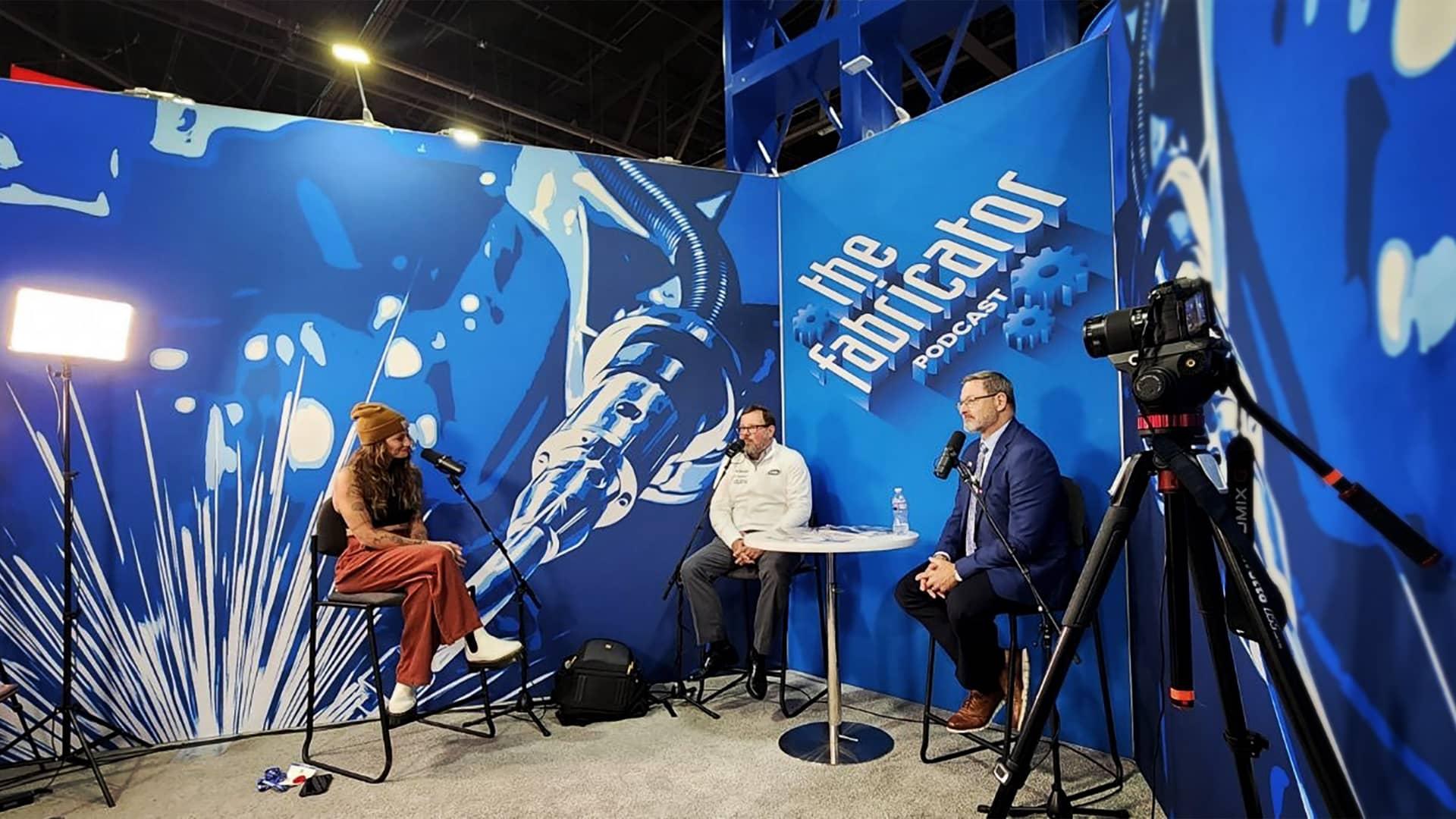
About This Podcast
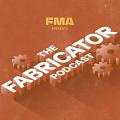
All Episodes
-
 Ep. 055
Ep. 055 -
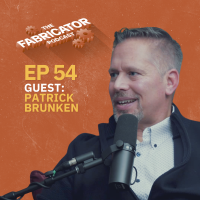 Ep. 054
Ep. 054 -
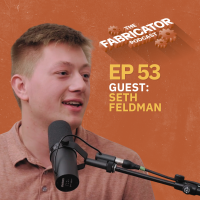 Ep. 053
Ep. 053 -
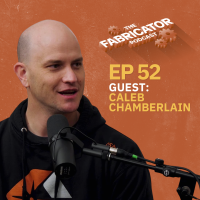 Ep. 052
Ep. 052 -
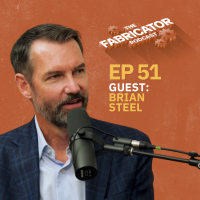 Ep. 051
Ep. 051 -
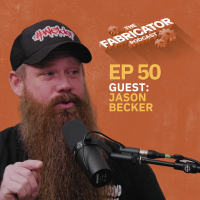 Ep. 050
Ep. 050 -
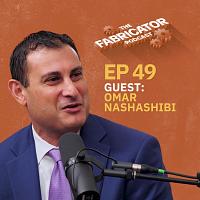 Ep. 049
Ep. 049 -
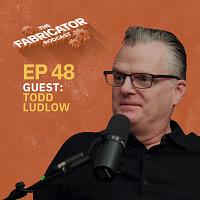 Ep. 048
Ep. 048 -
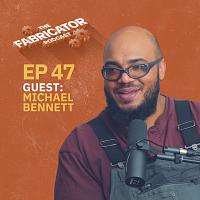 Ep. 047
Ep. 047 -
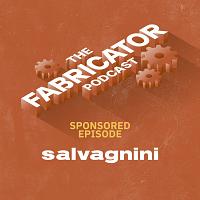 Bonus
Bonus -
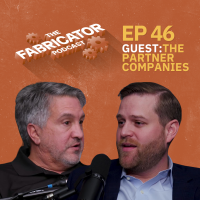 Ep. 046
Ep. 046 -
 Ep. 045
Ep. 045 -
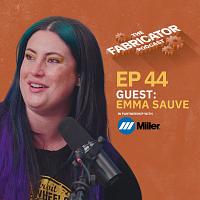 Ep. 044
Ep. 044 -
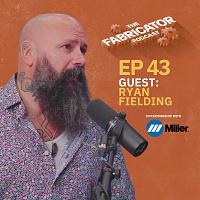 Ep. 043
Ep. 043 -
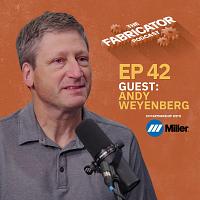 Ep. 042
Ep. 042 -
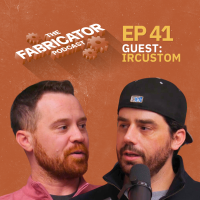 Ep. 041
Ep. 041 -
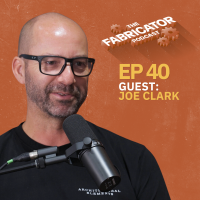 Ep. 040
Ep. 040 -
 Ep. 039
Ep. 039 -
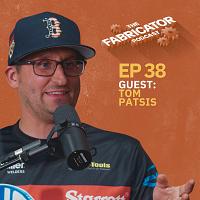 Ep. 038
Ep. 038 -
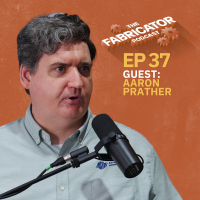 Ep. 037
Ep. 037 -
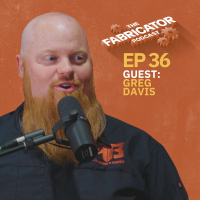 Ep. 036
Ep. 036 -
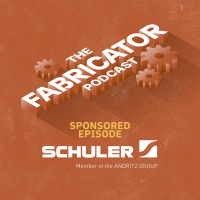 Bonus
Bonus -
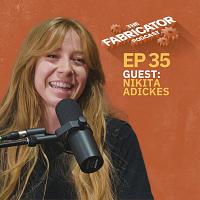 Ep. 035
Ep. 035 -
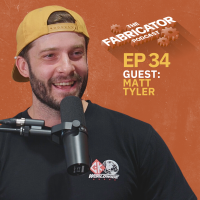 Ep. 034
Ep. 034 -
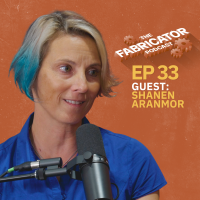 Ep. 033
Ep. 033







